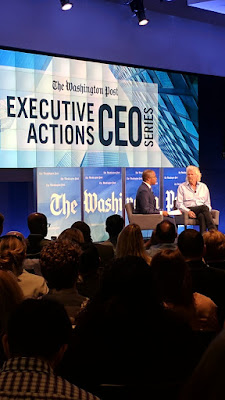Richard Branson owns one of the British Virgin Islands, but, on Friday April 28th, concern about climate change brought him out of his tropical paradise to Washington.
In advance of attending the climate march on Saturday April 29, the Virgin CEO sat down with Jonathan Capehart of the Washington Post for a wide ranging discussion.
Before answering Capehart’s first question, he untied the reporter’s neck tie and tossed it away, displaying his patented eccentricity and disdain for formality. Branson had an unconventional upbringing and while he never received a university education, he “learned through meeting fascinating people and through amazing experiences.”
Branson has innovative ideas to improve the world and prevent the potentially debilitating effects of climate change. Along with other billionaires, he created a monetary prize for anyone who can create a way to remove carbon from the atmosphere.
He also suggested that coal is not coming back in the United States, but that coal mining regions can be converted to clean energy centers. "People who used to mine coal could now lay solar panels and of roofs and and help to build wind energy plants." Clean jobs in West Virginia, Pennsylvania and Kentucky would help these devastated climates while also improving the climate. (This is similar to the Energy Efficient MBS investment CIR developed in 2006.)
While Jonathan Capehart asked some very good questions and is a respected journalist, he arguably could have facilitated a more compelling and captivating discussion with a character like Branson. I would have asked about the business strategy of Virgin and the future of disruptors in continuing to push innovation. Additionally, I would have liked to hear Branson address the question of whether the next generation of disrupters will come from established companies (Amazon, Apple, Virgin) expanding into new sectors or from new startups that will challenge the established order. Capehart spent several minutes on Branson’s personal relationship with the Obamas, which, although interesting, used time poorly: a brief discussion of their shared policy initiatives would have sufficed.
Branson is cautiously optimistic about the future and contends that, with some exceptions, the world is improving. Conflicts are at historic lows and human rights advances are seen across the world. Branson is optimistic regarding his own future as well and stated that at 65, he hopes to live for at least another 30 years.
When asked about his legacy, he suggested it is much too early for such a question since he is still creating a lasting impact on the world.
In advance of attending the climate march on Saturday April 29, the Virgin CEO sat down with Jonathan Capehart of the Washington Post for a wide ranging discussion.
Before answering Capehart’s first question, he untied the reporter’s neck tie and tossed it away, displaying his patented eccentricity and disdain for formality. Branson had an unconventional upbringing and while he never received a university education, he “learned through meeting fascinating people and through amazing experiences.”
Branson has innovative ideas to improve the world and prevent the potentially debilitating effects of climate change. Along with other billionaires, he created a monetary prize for anyone who can create a way to remove carbon from the atmosphere.
He also suggested that coal is not coming back in the United States, but that coal mining regions can be converted to clean energy centers. "People who used to mine coal could now lay solar panels and of roofs and and help to build wind energy plants." Clean jobs in West Virginia, Pennsylvania and Kentucky would help these devastated climates while also improving the climate. (This is similar to the Energy Efficient MBS investment CIR developed in 2006.)
While Jonathan Capehart asked some very good questions and is a respected journalist, he arguably could have facilitated a more compelling and captivating discussion with a character like Branson. I would have asked about the business strategy of Virgin and the future of disruptors in continuing to push innovation. Additionally, I would have liked to hear Branson address the question of whether the next generation of disrupters will come from established companies (Amazon, Apple, Virgin) expanding into new sectors or from new startups that will challenge the established order. Capehart spent several minutes on Branson’s personal relationship with the Obamas, which, although interesting, used time poorly: a brief discussion of their shared policy initiatives would have sufficed.
Branson is cautiously optimistic about the future and contends that, with some exceptions, the world is improving. Conflicts are at historic lows and human rights advances are seen across the world. Branson is optimistic regarding his own future as well and stated that at 65, he hopes to live for at least another 30 years.
When asked about his legacy, he suggested it is much too early for such a question since he is still creating a lasting impact on the world.
